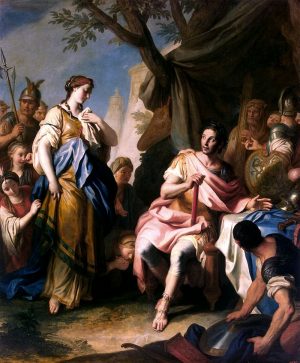Roxana was a Bactrian princess born around 340 B.C. in a region that modern-day Afghanistan and Uzbekistan now cover. Her father was Oxyartes, a Bactrian nobleman.
When Alexander the Great captured Bactria and Sogdia, Oxyartes and other war chiefs continued to resist the Macedonian army. They set up a fortification that became known as the Sogdian Rock. However, in 327 B.C., they were eventually conquered by Alexander the Great. Later, Alexander attended a celebration in the house of a Sogdian nobleman named Chorienes. It was here that Roxana was introduced to Alexander as Oxyartes’ daughter.
Roxana was in her late teens or early twenties when Alexander married her, amid disapproval from Macedonian generals. The marriage was politically useful, though, as it automatically made the Sogdian army more accepting of Alexander’s rule and lessened their rebellious tendencies. After this, Alexander journeyed to India, and there, he designated his new father-in-law, Oxyartes, as the governor of the region known as the Hindu Kush. At this time, Roxana was in Susa, and Alexander headed over to her, then appointed one of her brothers to the cavalry. Alexander also had in his best interests the Persians’ acceptance of his rule, so he also married Stateira II, the daughter of Darius, the former Persian king.
When Alexander suddenly died in 323 B.C., Stateira II was rumored to have been killed on the orders of Roxana. Roxana was also rumored to have murdered Drypetis, Stateira’s sister, and Alexander’s third wife, Parysatis.
Roxana was still pregnant with Alexander’s son, and the transfer of power became a concern among Alexander’s supporters and his generals, Perdiccas and Ptolemy. Meanwhile, the Macedonian soldiers voiced their fear of what they called a “Persianization” of the Macedonian imperial court. Ultimately, Alexander’s generals reached an agreement to declare Alexander’s half-brother, Philip III Arrhidaeus, as king and wait for Roxana’s child to be born. The generals further agreed that if the child is a boy, he would be declared king, and a caretaker guardian would be assigned to him.
Roxana’s son was born in 323 and was named Alexander IV. Philip Arrhidaeus’ wife, Euridice II, started intrigues, but Olympias, the mother of Alexander the Great, took Roxana and Alexander IV under her care in Macedonia. However, one of Alexander the Great’s generals’ sons, Cassander, was now trying to consolidate power for himself. Cassander ordered the execution of Olympias in 316 B.C., and he had Roxana and her son thrown into prison in Amphipolis. The following year, the general Antigonus consequently denounced Cassander for his actions. Around four years later, Antigonus and Cassander signed a peace agreement wherein Alexander IV was acknowledged as king but under the guardianship of Cassander. Macedonians opposed this guardianship, and they called for Alexander IV’s release. Instead, in 310 B.C., Cassander ordered one of his men to poison Roxana and her son. Alexander was only around 13, and Roxana was only 30.
